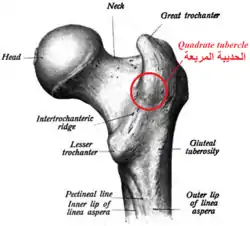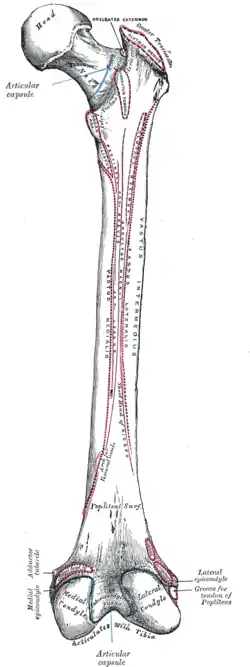Quadrate tubercle
The quadrate tubercle is a small tubercle found upon the upper part of the femur, that serves as a point of insertion of the quadratus femoris[1] along with the intertrochanteric crest and the linea quadrata.
| Quadrate tubercle | |
|---|---|
 Right femur. Posterior surface. (Quadratus femoris labeled.) | |
 Right femur. Posterior surface. (Quadratus femoris labeled at top center.) | |
| Details | |
| Identifiers | |
| Latin | tuberculum quadratum |
| TA98 | A02.5.04.011 |
| TA2 | 1370 |
| FMA | 43709 |
| Anatomical terms of bone | |
The quadrate tubercle is located about the junction of the upper one-third and lower two-thirds, on the intertrochanteric crest. The size of the tubercle varies; it is not always located on the intertrochanteric crest. Adjacent areas can also be part of the quadrate tubercle, such as the posterior surface of the greater trochanter or the neck of the femur. In a small anatomical study it was shown that the epiphysial line passes directly through the quadrate tubercle.[2]
Additional images
 Right femur. Posterior surface. (Quadratus femoris and Quadrate tubercle labeled.)
Right femur. Posterior surface. (Quadratus femoris and Quadrate tubercle labeled.)
References
- "muscle actions". Retrieved 2009-11-16.
- Sunderland S (January 1938). "The Quadrate Tubercle of the Femur". J. Anat. 72 (Pt 2): 309–12. PMC 1252427. PMID 17104699.
This article is issued from Wikipedia. The text is licensed under Creative Commons - Attribution - Sharealike. Additional terms may apply for the media files.
